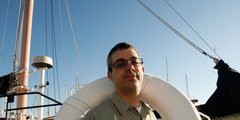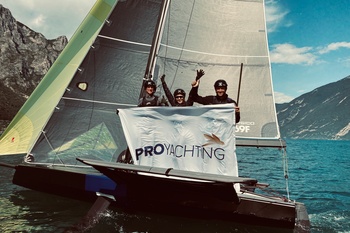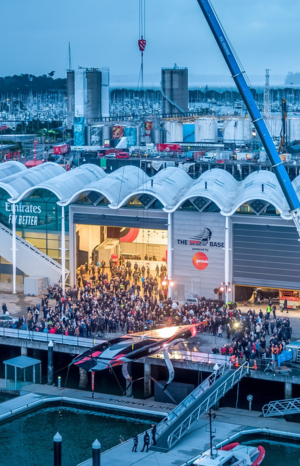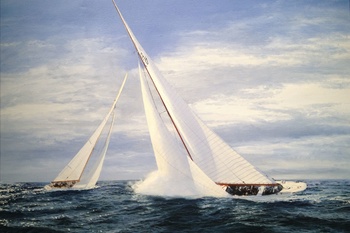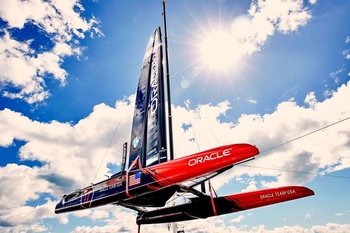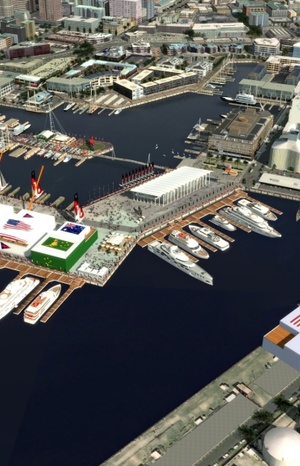How Chris Dali saved San Francisco from getting caught in the America's Cup...
Port official Jonathan Stern walks as fast as he says, and San Francisco's new mayor, Ed Lee (took office in mid-January - itBoat), a man of pocket size, kept up with him with great difficulty - both verbally and physically. At a press presentation late last month, Stern wore like a turbocharged realtor, showing the newly appointed mayor a set of barely alive port buildings that are about to become a sparkling stronghold of the Thirty-fourth America's Cup by 2013. Stern's lexicon is teeming with "our current vision" and "we're going to tear this one down.
Lee was delighted, and no wonder: it was impossible to think of a more beautiful morning to demonstrate the north coast of San Francisco. When it came to hosting the Cup, "not only did San Francisco make the right decision," said Mayor Lee, proudly standing against the glittering bay, "but the whole world made the right decision.
Former Supervisory Board member from the sixth city district, Chris Dali, was not among a bunch of elected politicians and officials who had gathered then on Pier 27 to politely applaud the mayor's speeches. It was impossible to even think about a gallant former observer going in there. However, if it hadn't been for him, no one would have even been there.
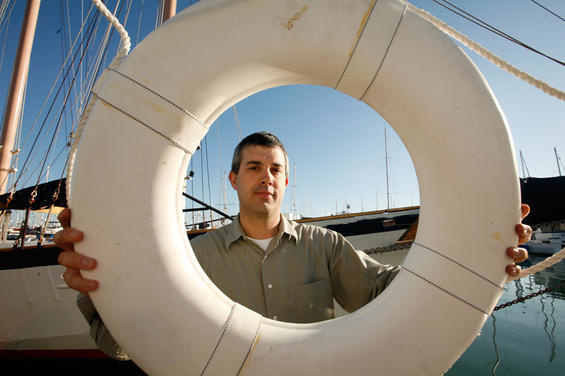
In this city, it is difficult to find anyone who treats Dali neutrally. He is either loved or hated. If it had occurred to him to promote the use of water, many residents would immediately stop washing - on principle. His reputation as a "black belt of boorishness" has been perpetuated for centuries in the memory of people in the last days of his tenure, when he and other progressists fell victim to some political manipulation that eventually led to the anointing of Lee as mayor. This failure inspired Dali's last epic tirade against his enemies, and the tirade was volcanic even by his own high standards. The overthrown official walked in the conference room and watered his colleagues from their hips, not stingy, eventually crowning the flow of eloquence with the words "Khana to you! "You'll shit all polymers!" to Council Chairman David Chiu, Lee's ally. For a man who spent 10 years in a very public position, it was an unsuccessful Dembele chord. It turns out that the outgoing Dali managed to simultaneously and beautifully slam the door, and cry like a girl.
But the real dreary gift of Dali to this city was his resistance to the manic aspiration of the previous mayor Gavin Newsom to drag to San Francisco America's Cup and to conclude on this occasion, an expensive deal neatly before his departure for a new post in Sacramento (since January 2011, Newsom holds the post of Deputy Governor of California - itBoat).
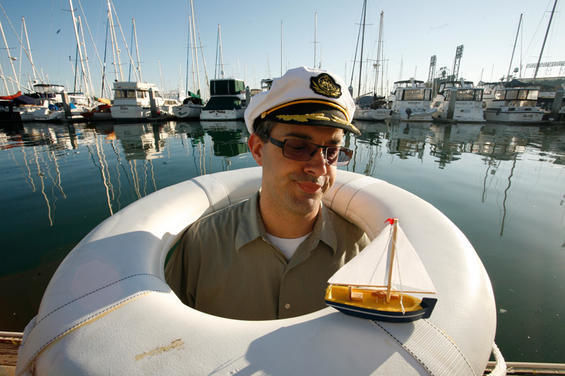
In the process of this confrontation, Dali managed to break an agreement to hand over the Pier 50 Cup, near AT&T Park on the central waterfront. The losses that the city would have suffered only on this deal were later estimated at about $58 million at once and about the same amount later, at the expense of land allotments. The agreement, which is now in effect, refers only to pier 27, and the area of land transferred to the head of Oracle, billionaire and yachtsman Larry Allison, is reduced from 14 to about 8 hectares. Such oppression of the Cup (mainly achieved by the exclusion from the conversation of the 50th pier) should save the city very substantial money. According to the plan for the development of the northern coast of San Francisco will now lose $ 12 million, but the money can then be "repelled", and even more.
Dali was known for his belligerent assertiveness, and the pressure was overwhelming when he bore the original Cup deal from the height of his position in front of all those who were ready to listen (and before many who didn't want to listen at all). Although the form of his sayings left much to be desired, their content was difficult to ignore.
"I have to pay tribute to Chris Dali for bringing up the question of how much the central waterfront option would cost the city," says Chiu, who brought Dali's wrath upon himself. The conversation that observer Dali had then started helped the city save a lot of money," says another member of the Supervisory Board, John Avalos. - Otherwise, I'm afraid we would have had to get into a very bad deal."
The fears Dali expressed in public have long been a source of concern to many of his colleagues. Well, or they would have been pestering when they were checking the numbers. The important thing is that it was Dali who eventually forced the Council's accountants to disclose the amounts.
Although many city officials have told us that the San Francisco Port Authority was terrified of the idea of giving Allison huge pieces of land along the central coast for no reason, in fact the port has already publicly signed the original plan. As it turned out, the city needed someone who didn't care about its political future. Someone who did not tremble awe at the thought of hosting the largest sailing show in the world and was immune to the dazzling fever of the America's Cup. Someone who could officially, excuse me, shit all the raspberries with a finger in the books. Anyway, San Francisco needed a jerk, with horns of great punch.
Dali was great for that role.
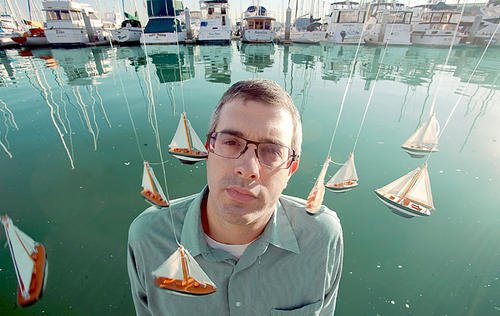
When it comes to how wonderful the whole America's Cup catavasia looks, San Francisco officials are reflexively drawn to knocking on wood. Instead of the originally conceived expensive accommodation with the center in Mission Bay, a dark neighborhood punctuated with variations of the building that adorns bottles of Stolichnaya, the future complex is elegantly arranged on the north coast.
If the deal with the 50th pier would have destroyed the port's budget and then sucked millions more dollars out of the city's fund, the current arrangement looks suspiciously good for all parties involved - at least the version that was signed in mid-December. City financiers estimate the direct losses of the city at 11.9 million dollars, while auditors estimate the direct losses at 13.3 million dollars. At the same time, accountants say that the city can barely repay this money for the next seven (!) decades, but the auditor foresees a profit of almost 24 million.
Costs for the upcoming Organizing Committee of the race, established by Ellison, also greatly reduced: they have to invest "only" 55 million for infrastructure construction, which is very modest compared to 155 million in the original plan (the city will have to reimburse this money in the future course of the case, but it has already been accounted for in accounting analyses).
Potentially unaffordable dredging costs will now be borne by the organizing committee. Also, the placement of the America's Cup on the north coast will require overcoming fewer environmental barriers. And on top of that, moving the race northwards will not negatively impact the nearly one billion dollars in profits that the race is expected to bring to private business. And there was no doubt that the coming billion-dollar gold rain will spill over into local hotels, restaurants, construction companies and other institutions, even in the most skeptical analyses.
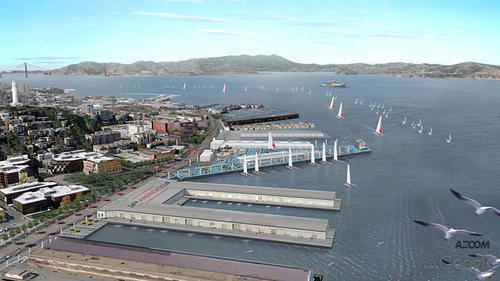
Some city officials claim that all this beauty was kind of predetermined from the beginning. They say that instead of subscribing to a very expensive project, the legislative process "worked by itself" and voila! - San Francisco now enjoys the best possible option. But the legislative process didn't have to work by itself. San Francisco regularly encounters bad deals, and it could do the same with the America's Cup. Or he couldn't have made any deals at all and successfully flew past the Cup.
Most city officials are too obsessed with posing against the backdrop of the spectacular sketches of the upcoming Cup, where huge boats rush dashingly in front of crowds of furious spectators to recall how the current happy result was achieved. Despite our many requests, the port management has not condescended to comment on this article. But the majority of politicians from the municipality say that they are fed up with porters whining that the mayor's office is clutching them, and at the same time they are preparing a deal that will suck millions of dollars out of the city in the form of tenants expelled from the port, construction costs and free land rent for the Organizing Committee of the race.
Port Director Monique Moyet has not responded to our requests to comment on this. But Dali claims that she once took him aside and complained that she was "the last to know" about plans to rent pier 50 and other facilities to the Organizing Committee for a period of 66 to 75 years. "I told her she couldn't be the last to know, because, understandably, I was the last to know," Dali says. This fact made Dali particularly angry, because the lion's share of the allotted land was in his district.
Several people from the city administration told us that the port authority was very concerned about the plan for the "central" location of the Cup, and that the port was simply stunned by the scale of the upcoming spending. Calculating the long-term and short-term costs associated with the transfer of large port-land plots to the Organizing Committee is not a quick matter, and the decision should have been made no later than December 31. Uncomfortable financial issues, which Dali spit out like from a machine gun, remained unanswered, and the financial and analytical report with all the figures was still under development. "We were less and less pleased with some of the provisions of the treaty and the inconsiderate answers coming from the administration," says Ross Mirkarimi, also a member of the Council and one of the key negotiators. - There was no information about the benefits of all this business for the city, and the mayor's office was already galloping to sign the agreements. The mayor's office, for its part, makes a good point that if the city "hadn't demonstrated concrete measures and achievements, we would have missed our chance.
All this storm of passion, however, could not knock Dali off his favorite course - to stay for the America's Cup enemy number one. After ten years of defiant antagonism on his part, the people of the mayor did not even think about canvassing him to vote until all the numbers are fully counted. If there was anything good about my membership on the Supervisory Board," says Dali, "the other side didn't even try to compost my brain.
There are many hurried judgments about Dali based solely on his unfriendliness, donkey stubbornness, love of strong vocabulary and ugly beard. But that's not all he's made up of. Even his most ardent enemies admit that he is exceptionally smart and competent. But he can't do it any other way. It's impossible to treat people like him and travel on the same charm.
In addition to being stubborn, Dali had other reasons to object to the first options for the America's Cup deal. As a former chairman of the budget committee, he has a rich history of spending cuts. He rewrote the city's administrative procedures, forbidding departments to produce and print holiday greeting cards with public funds (this happened, as he recalls, "after I got a mountain of those damn Christmas cards"). Huge, with "War and Peace" the size of his annual reports were ordered to be sent only electronically ("This shit nobody reads anyway. Well, I certainly wouldn't").
No wonder Dali was wary when he saw a contract on the horizon giving free land to a billionaire yachtsman for construction in the city's coastal area, and pushed by his sworn enemy, the mayor.
Dali's most convincing argument was math. Roughly calculating the figures provided by the port and the city department of labor and economic development, he saw that they do not promise anything good to the city. "I am not a big fan of Larry Ellison," he said. - And this race of his is just a pompous party for the elite," he said. But even if it was, the real reason I was against the San Francisco bid was because we'd just go broke. Even the Port Authority agreed with me, even though they shouldn't have said so.
When the America's Cup presented its plan for the deal to the Council, Dali brought with him a piece of paper written with very sensitive questions. What will it cost to demolish port facilities on pier 50? How much will it cost to relocate tenants? Re-locating port facilities? Will the port be able to afford it? And the city? How much money will it pull out of the city fund - now and in the future?
The press then wrote that Dali said so much that his colleagues had to remember the rarely used "ten-minute rule" (that is, as in our Duma, "turn off the fifth microphone" - itBoat). In the end, instead of a bunch of serious and substantiated economic questions asked of Dali, everyone remembers only his despotic promise to blow the whole project with environmental lawsuits, "so that these boats will not be able to see the water here".
That is, in fact, Chris Dali's paradox. Crazy behavior can help draw attention to important issues, but only to a certain extent. With his attacks on the America's Cup, he has simply earned a reputation as a maniac protesting against a great idea. The mayor's representative even had the pleasure of telling the press for the millionth time that "well, it's just Dali in his usual repertoire".
The only thing that saved Dali was that he was right.
"He raised issues that could not be dismissed," said his administration colleagues. - He was right when he talked about the original contract and what it meant to the city. It seems simple that in this case the idea did not reach the public because of who (and how) voiced it".
It was easy to get rid of Chris Dali. What he was talking about was harder to get rid of.
He and all the other Cup opponents were waiting for an audit report to be published, like the children of Christmas. When the report was published, he didn't disappoint. The report's author concluded that meeting the conditions set by the Cup organizers would cost San Francisco up to $56.5 million at once and 143 million in the long run. The Cup town on the central coastline would have cost at least as much - another 101 million in total.
The expenses of the Organizing Committee were also planned astronomical - to improve infrastructure required 150 million dollars. In addition to providing the Allison Group with a free 66-75 year lease of land for development, all these costs would have to be later reimbursed to the city.
As a result, the plan to place the Cup in the central coastal zone was losing more and more supporters. Even the San Francisco Giants baseball team intervened, and outraged to discover that the plan was for Allison to leave a number of areas that the team had long leased from the city and for which they themselves had big plans.
In general, Dali began to gain support from those from whom it was not expected at all. Dissatisfaction of port managers and baseball players became a powder keg, on which fell sparks carved by Dali. It burst instantly, so that the original plan did not leave any scrapes. That's exactly what our unrestrained Sixth Circuit watcher was counting on.
In the end, it turned out that Dali, who dreamed of ruining the deal, helped make it better for the city. Instead of killing the America's Cup, he made it stronger. Without wanting it, he helped the city.
It was because Dali didn't know the city had room for manoeuvre until almost the end of the process. He saw the negotiations on the central coastline as "all or nothing". Waving the audit report like a sledgehammer, Dali served as a destructive force. Everyone else - the port, city hall, the Supervisory Board - had to serve as a creative force: to pick up the wreckage and build something new out of it.
There is an explanation for the fact that the northern coast was not initially considered as a possible place for the Cup at all. The city proceeded from the assumption that the Cup would be held on traditional single-hull boats, for which special protective barriers - breakwaters - had to be built at the entrance to the port. Pier 27 was planned to be turned into a terminal for cruise ships in the long term, so breakwaters were out of the question there. But when it turned out that the races will be held on two-hull catamarans, which are so stable that there is no need in breakwaters, pier 27 returned to the agenda.
As a result, to the apparent dissatisfaction of the organizing committee of the Cup, the variant with the northern coast became the basis of the official application of San Francisco. The city won with it, getting the right to host the Cup, although the organizing committee at that time had been demonstratively flirting with the city of Newport for three weeks, trying to get San Francisco to return to the "central plan".
Now the city has to figure out exactly what it's got. Auditors and accountants have a long way to go before the contract, in which full 16 pages were crossed out and edited after (!) Organizing Committee and City Hall put their signatures under it. There will be a place for other Cup opponents to play, but not Chris Dali anymore.
Dali now penetrates into another accounting: now he is a modest owner of a bar called "Buck Tavern", where he and I sit while he exams another candidate for bartending for English and Spanish.
Dali says, "The city may have gotten into a very shitty deal. But the previous plan was even shittier. Much shittier."
Now that Dali is pouring drinks instead of watering his fellow Council members, there is clearly more harmony in the Council. But it remains to be seen whether their consent and decency alone will suffice to stand up to an unfavourable deal that is in full swing on clearly well-oiled skis.
"There is an advantage," Dali admits, "in having someone on the Council who is not concerned about a career or what the newspaper people think, and is not thinking about getting an invitation to the mayor's next reception. If those are your main concerns, you will never be able to do what I have done. Anyway, I'm proud to have been an official goat in that situation."
Source: How Chris Daly saved San Francisco from a bad America's Cup deal (SF Weekly) by Joe Ashkenazy.

